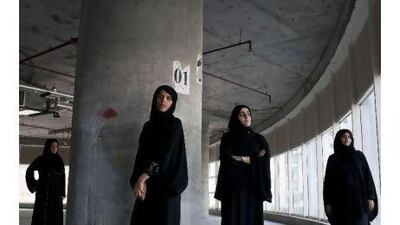Abu Dhabi // Maitha al Dinhani often runs out of things to do at her internship and wishes she had more opportunities outside of her responsibilities in translating economic and political documents.
But the UAE University student, 22, said although she believed she might get better work experience interning in the private sector than she does at a government-run research centre, it is not something she would consider.
"Each has positives and negatives, but I do not know anyone who is working for these companies," Ms al Dinhani said.
"Even though the work in the private sector can be more interesting, I know that in the public sector there are shorter hours, more holidays and higher salaries, and the jobs are secure. I want my internship to lead me to that kind of job."
As the latest series of measures to improve the representation of nationals in the private job market was announced this month, Ms al Dinhani and some of her peers are still looking for government positions.
After those announcements, the public relations firm Bell Pottinger organised a round table with a number of its interns to consider the progress made so far.
Khadija al Naklawi, one of those interns, admitted she was nervous about taking a placement outside the public sector and that she was the only one among her friends to do so.
"My work is very interesting and I think I am getting much better experience that will help me in my career - participating in meetings or writing memos and press releases - than my friends are getting at their internships," Ms al Naklawi said.
Robert Gardener, the director of Bell Pottinger's Middle East division, said he had faced some wariness from students while recruiting for internships.
But Mr Gardener said that was partly due to a lack of information from private companies about the benefits of looking beyond shorter hours and better pay.
"It is unfortunate because there is something to be offered on both sides," he said. "Khadija is confident going into meetings and has had exposure to solving problems; skills that I think will be useful for her whether she goes into a public sector job after this or not.
"For us, having someone with local insight and contacts is invaluable."
Budour Saleh Mubarak, an intern at the Abu Dhabi Education Council, said that when she was approached at her school by a private employer, she was wary of the unknown.
"I did not know the type of work and felt afraid that it might be a bad experience," Ms Mubarak said. "I did not know the company and did not want to be the first Emirati to go there."
She said she sometimes tired of her training: "I do not like the machine, every day, the same thing again and again."
But Ms Mubarak is confident her internship will lead to a permanent position that will carry her through her career.
"It is common for people and families I know to stay in one job for their career and not move around so much," she said. "It will be better to get into that position early on."
Ms al Dinhani and another intern at the research centre, Noura al Kendi, acknowledged they sacrifice some luxuries working for the government, such as work flexibility.
"Many documents are sensitive, so in many government jobs we are not allowed to work from home," said Ms al Kendi. "If our hours are from 8am until 3pm but the work levels are different, we are not allowed to leave early but just sit in front of our desk.
"In private companies maybe there is better flexibility to get things done, and if it is interesting work maybe you would not even notice the longer hours."
A recent report by the Ministry of Labour showed there are between 20,000 and 30,000 Emiratis in the private sector, out of 3.8 million employees. But 70 per cent of employees in the government sector are Emirati.
Three resolutions were issued this month to focus on encouraging the next generation to be active in the private job market.
"The private sector has such a huge range of opportunities and, especially for interns, it is important to realise that anything worth achieving is not always easy," said Claire Duce, a partner at the UAE branch of the consultancy PricewaterhouseCoopers, who oversees the company's Emiratisation strategy.
"It is about being in a position to shape your own destiny and that will mean long hours.
"The first three to five years are the hardest but you will find yourself in a better position … if you treat it as an extension of learning."

